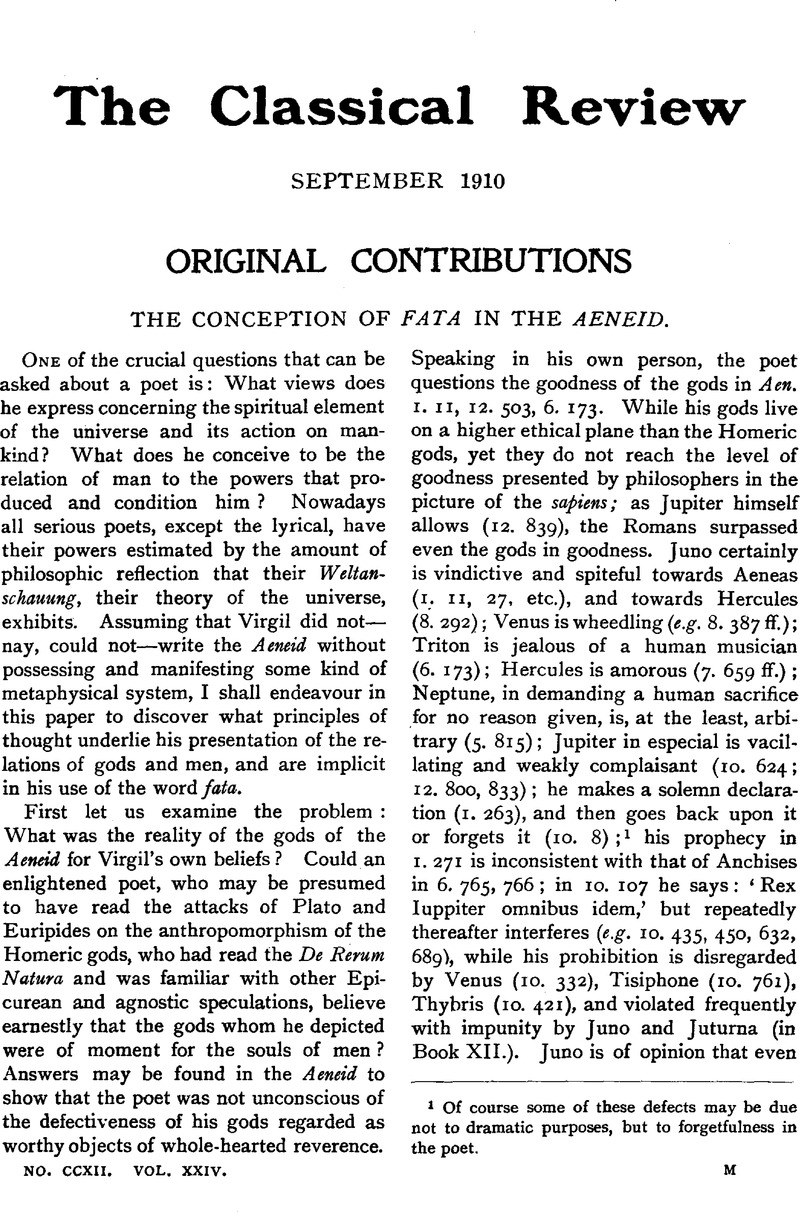Article contents
The Conception of Fata in the Aeneid
Published online by Cambridge University Press: 27 October 2009
Abstract

- Type
- Original Contributions
- Information
- Copyright
- Copyright © The Classical Association 1910
References
page 169 note 1 Of course some of these defects may be due not to dramatic purposes, but to forgetfulness in the poet.
page 170 note 1 Of Lucretius, who in a similar spirit invoked Venus while denying that the gods interfered with human affairs, Sellar writes: ‘Though the ultimate principles of Lucretius are incompatible with a belief in the popular religions of antiquity, his mode of conceiving the operation of law in the universe [fati foedera, 2. 254] is not irreconcilable with the conceptions of modern Theism.’—Roman Poets of the Republic, pp. 342, 343, q.v.
page 170 note 2 For a stimulating philosophic statement of this metaphysical position, see ProfessorJames's, W. essay, ‘The Dilemma of Determinism,’ in The Will to Believe, p. 181.Google Scholar
page 170 note 3 On this theory the intermediate activity of the gods need not be of great importance to human beings. In the Aeneid the only actions of the gods that were evidenced by objective signs were: Book II.: Appearance of the snakes and of fire on lulus' head. Book V.: The burning of the ships through Iris. Book VII.: The opening of the gates of war by Juno. Book VIII.: The bringing of armour to Aeneas by Venus. Book IX.: The transformation of the ships to sea-nymphs.
page 171 note 1 It is most unlikely that the Parcae were identified by Virgil with the Moirai who, in Aesch. P.V. 516, Agam. 1026, are spoken of as powers overruling Zeus, for (1) mention of them in the Aeneid is rare and insignificant; (2) by art and poetic convention (as in Catullus and Eclogue 4. 47) the idea of them had become too material and unspiritual.
page 171 note 2 In 2. 154 si fata deum, si mens non laeua fuisset, the alternatives may be (1) the oracles as distinguished from the Trojan interpretation of them (mens); (2) the course willed by the gods as distinguished from the Trojan resolve which acted in furtherance of that course.
page 171 note 3 We sometimes read of Jupiter's relation to fatum; but the fact that the plural cases of fata occur in the Aeneid 104 times, while the singular cases occur only 15 times, shows that Virgil had no desire to use the word in the abstract philosophical signification current—e.g. in Cicero's De Fato. Lucretius, who seldom uses the word, has a passage (2.254–257) in which fatum and fata seem identical in meaning.
page 172 note 1 Cf. also 10. 471–2.
page 172 note 2 This passage, a reminiscence of Il. 16. 433, shows an instructive dissimilarity from it. In Homer Zeus, while allowing that it is Sarpedon's portion (μοῖρα) to be killed, yet thinks about saving him, but is shamed from that by Hera. Jupiter in the Aeneid never thinks of violating fas or fata (only goddesses, Juno and Cybele, dream of that); further, he spontaneously grows indignant because Aesculapius interfered with natural laws (7. 770).
page 172 note 3 But this principle is inconsistent with the ideas in 4. 620: ‘cadat ante diem’; 4. 696: ‘quia nec fato merita nec morte peribat | sed misera ante diem’; 10. 624, 11. 160, 12. 149 ff., 395.
page 173 note 1 In Proc. Class. Assoc, October, 1906.
page 173 note 2 Cf. Bradley, , Shakesperean Tragedy, pp. 14–15Google Scholar; Raleigh, , English Novel, pp. 223–225.Google Scholar
- 2
- Cited by




